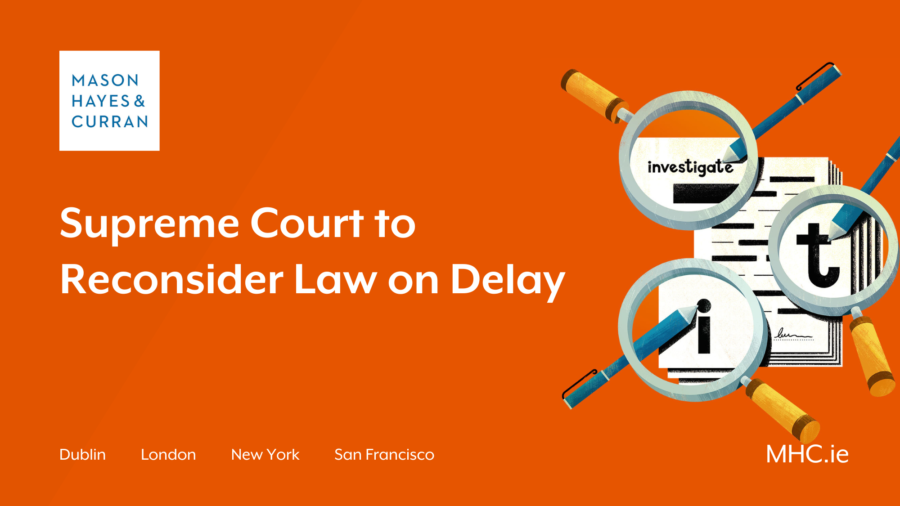
The Supreme Court will reconsider the test for striking out cases for delay. Our Public, Regulatory & Investigations team review the basis for this in the context of the current law and the possible future impact for cases.
Introduction
The Supreme Court recently granted an individual leave to appeal to it after his case was dismissed for undue delay by both the High Court and the Court of Appeal. This case of Kirwan v O’Connor[1], is significant as the Supreme Court decided that it raised an issue of general public importance. In particular, the Supreme Court considered that the long-standing test as embodied in the Primor[2] case governing the striking out of cases for inordinate and inexcusable delay may need to be revised or reconsidered.
Background
In the Kirwan v O’Connor case, which concerned a property dispute, Mr Kirwan issued High Court proceedings in 2013 for breach of contract. However, he did not progress his case for five years until the defendant brought an application to court in 2018 to have Mr Kirwan’s case dismissed for delay in prosecuting his claim. The High Court agreed and dismissed Mr Kirwan’s case for inordinate and inexcusable delay. This decision was upheld on appeal to the Court of Appeal.
The current law on delay – the Primor test
A long and well-established body of case law exists for dismissing cases for delay in situations where litigants have been slow to progress their claims. This is known as “delay for want of prosecution”. The courts exercise their discretion to dismiss a claim based on the interests of justice. The test that has been applied by the Courts since 1996, is the three-pronged test laid down by the Supreme Court in the Primor case. It is commonly referred to as the Primor test, which is as follows:
- Is the delay inordinate?
- Is the delay inexcusable i.e. unjustifiable?
- If the answer to both questions (1) and (2) is yes, the Court must then consider whether the balance of justice favours the dismissal of the proceedings.
To have a case dismissed for delay based on this test very much depends on the facts of each case. It is usually clear if there has been inordinate delay. For the delay to be excusable there must be evidence relating to the actual case to justify the delay. Excuses concerning personal or financial circumstances or staffing difficulties, change of solicitors, looking for solicitor’s files or health issues are irrelevant.
The factors to be taken into account when considering the balance of justice include:
- Prejudice to the defendant in getting a fair trial due to the delay
- The availability of witnesses and documentary evidence
- With a late start in bringing proceedings, there is a greater onus to progress the case speedily
The rationale for dismissing claims for delay
It is a question of basic fairness. The courts have a duty to ensure that litigation is conducted in a timely manner. This requires a balancing by the courts of the competing Constitutional rights of access to justice and the right to a fair and speedy trial. In recent years, there has been a growing judicial intolerance towards delays by litigants in progressing their cases to hearing. With the result that the courts have been more willing to strike out claims on grounds of delay in the prosecution of claims.
Application of Primor in the Kirwan v O’Connor case
Both the High Court and Court of Appeal found that the delay of five years in progressing the case by Mr Kirwan was inordinate and inexcusable, particularly the excuses relating to the fact that he was a lay litigant and could not obtain the original file. They also found that the balance of justice required dismissal of the case owing to the prejudice and reputational damage caused to the defendants by the delay on the part of Mr Kirwan.
Conclusion
The hearing of the actual appeal in the Kirwan v O’Connor case by the Supreme Court will be significant.
The Supreme Court stated that this case raises the question of how the Primor principles ought to be applied and whether they should be revised or reconsidered in some respects. The Supreme Court wants to avail of the opportunity presented by this case to re-examine this issue.
This is all the more important particularly as the courts have become increasingly critical of litigants who delay. This will have a bearing on all cases and particularly those concerning public bodies.
It remains to be seen what the Supreme Court will do; will the trend of dismissing cases for delay continue or will the Supreme Court use this as an opportunity to row back on this position?
We wait for developments.
For more information and expert advice, contact a member of our Public, Regulatory & Investigations team.
The content of this article is provided for information purposes only and does not constitute legal or other advice.
[1] Brendan Kirwan v Marguerite Connors Trading Under The Style of MJ O'Connor Solicitors [2023] IESCDET 34
[2] Primor plc v Stokes Kennedy Crowley [1996] 2IR 459
Share this:






